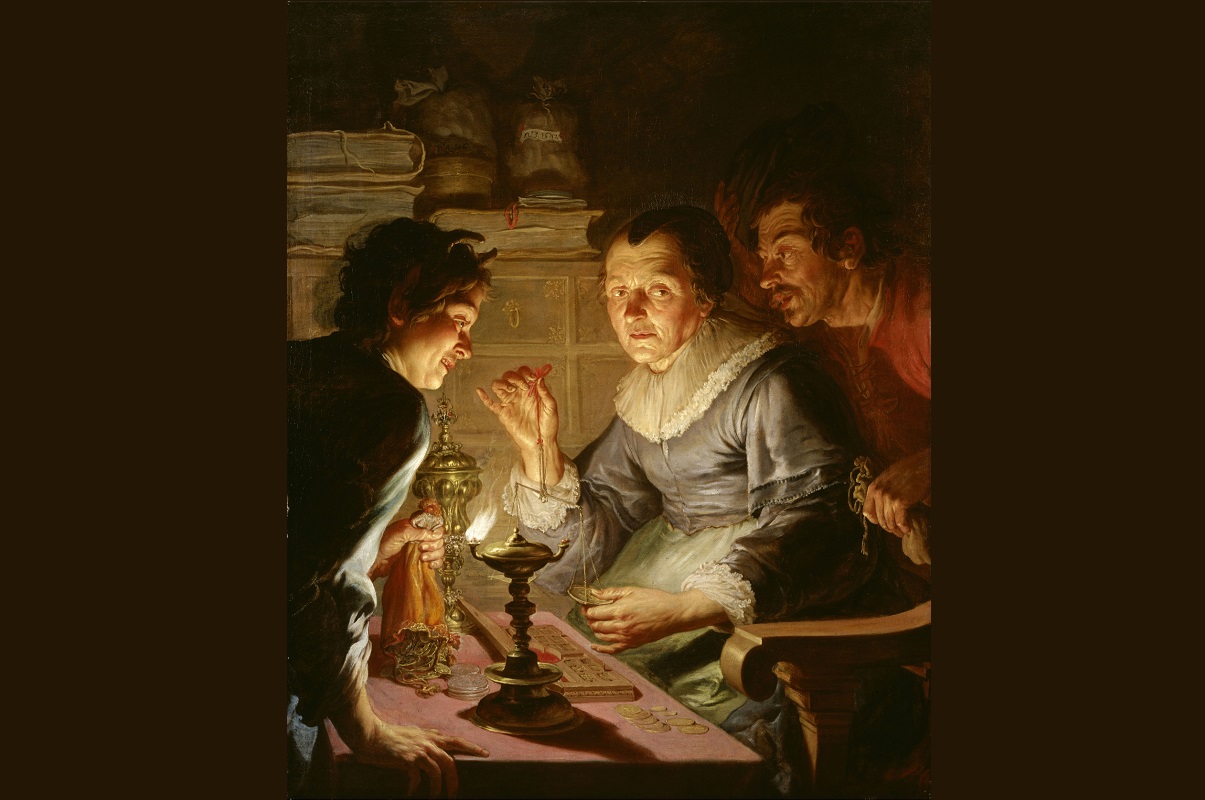By Amber Kinloch
Greed is an excessive love of worldly goods that leads to an unrestricted desire to acquire material things. We tend to associate it with money, but it can also be manifested in a love of clothes, jewelry, frivolous gadgets, the latest tech, houses, cars, etc.
Greed is often a subtle vice, one we easily excuse. We are young and just starting out in life—we do not have a penny to spare. Perhaps we’re a little older, married, with a house to keep up and a family to provide for. No, now is not a good time for giving to charity. And then we must save up for old age. Oh, and let’s not forget about making provisions for our health and safety, our honor, and a little pleasure. We work hard. Why shouldn’t we indulge ourselves a little with special dinners, a family cruise, subscriptions to various streaming services, etc.? It’s our money, isn’t it?
A Good Desire Twisted
There is nothing wrong with any of the things listed above. Money and worldly goods are not evil. They’re gifts given to us by God with which to serve Him and our neighbor.
The problem is, we tend to forget that. We take a free gift from God and view it as our rightful possession. We subvert the supernatural end of worldly goods, employing them for the satisfaction of our own selfish desires.
Perhaps we’re concerned about maintaining a certain social status like the Pharisees. But we can’t do it without special grooming products, a voluminous wardrobe, and fancy nail jobs. Maybe we desire comfort or pleasure in the form of a new leather sofa, an 80-inch TV, and an in-home bar setup. Or maybe our focus is on saving for a future when we’ll enjoy an unending, well-deserved rest as the rich fool dreamed he would (Luke 12:16-21).
Again, there’s nothing wrong with these things in and of themselves. But at some point, a question arises: “Do I have enough?” For most of us, the answer we tell ourselves is, “No.” This, despite a house cluttered full of stuff, or a bank account with six or seven figures in savings.
How Greed Blinds Us
Greed is a grievous sin, as we try to satiate our longing for God with the acquisition of material things. Instead of worshipping God, we make an idol of our wealth. Our pride is puffed up, and we leave ourselves prone to envying those who have more.
Underlying our selfishness tends to be fear and mistrust. God is boundlessly good and generous. He’s given us so much without our deserving it. Why should we worry? Doesn’t Jesus Himself reassure us, saying, “Look at the birds in the sky; they do not sow or reap, they gather nothing into barns, yet your heavenly Father feeds them. Are not you more important than they? (Matthew 6:26). Yet still we fret.
No wonder that we become blind to our neighbor and their needs like the Rich Man with Lazarus (Luke 16:19-31). We have so many unjustified “needs” of our own that we neglect to perceive or tend to others’ real needs. When we do extend ourselves to assist them, it tends to be out of self-interest.
Over time, we might come to see our neighbor as an obstacle to our desire for worldly goods. We resent those who place a check on our acquiring more, and grow cold and suspicious like Ebenezer Scrooge in Charles Dickens’ A Christmas Carol. We may resort to lying, cheating, stealing, and even violence, all the while, perhaps, feeling justified in our actions.
Worst of all, though, is the break greed produces in our relationship with God. Instead of storing up treasures in Heaven, we hoard up earthly goods (Matthew 6:19-21). Like the rich young man, we end up walking away from God sad and dissatisfied, because we have chosen worldly possessions over Him, our Eternal Good (Mark 10:17-22).
Combatting Greed
The conscious practice of gratitude is a good first step to countering greed. Gratitude pushes us to look outside of ourselves. It shows us the truth that everything we have is from God. It leads us to place our trust in Him, and motivates us to be generous in the hope of showing our love for Him.
With regard to generosity, it is helpful to recall the examples of the many saints who recognized the truth that, “It is more blessed to give than to receive” (Acts 20:35). One outstanding example from close to our own times is St. Katharine Drexel. The daughter of a wealthy banker, she put her substantial inheritance at the service of the religious order she founded to serve Native Americans and African Americans.
It is also wise to resolve on specific ways to cultivate a generous spirit. Figure out what tempts you to greed—comfort, social status, the desire for security—and combat that. Curb frivolous spending. Ask, “Is this really necessary?” Or, if you’re inclined to miserliness, reflect on how it’s displeasing to God for us to neglect the good things He’s given us to enjoy in due moderation.
Tithing a set portion of your income or the money saved from frivolous expenditures is a good idea. Strive to make it personal. Imagine that you’re giving the money directly to Christ because, in truth, you are in a way. He is present in the people in need whom your money will help. You might also think of how each time you practice almsgiving with love, you’re storing up treasures in Heaven.
Take time to periodically reevaluate what you can give. Have you invented any imaginary needs for yourself of late? What’s a small way you could stretch yourself this month in order to be able to afford to give a little more? Remember, greed and the cravings we have for worldly goods can be subtle. They can manifest in a way as simple as buying ourselves little extras during our regular shopping, perhaps on the excuse, “It’s on sale.”
Always bear in mind the poverty of Jesus who said of Himself: “Foxes have dens and birds of the sky have nests, but the Son of Man has nowhere to rest his head” (Luke 9:58). This is God speaking! If He underwent such deprivation for love of us, how can we be so stingy in practicing generosity?
Resist the fear that may underpin this sin and trust. God will supply our every need. Most of all, remember that He is our True Treasure. Let’s take care never to lose Him for mere earthly goods.

Amber Kinloch
Amber writes from the bunker of her living room. There she hunkers down with her laptop and a blanket while keeping an eye and ear tuned in to the activity of family life. Music set on loop keeps her energy flowing as she muses on the deeper happenings of ordinary life and what food to restock the fridge with.






0 Comments